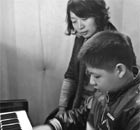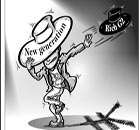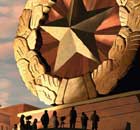Top Stories
City maternity wards roar softly in Year of the Tiger
By Yang Wanli (China Daily)
Updated: 2010-03-02 11:13
 |
Large Medium Small |
|
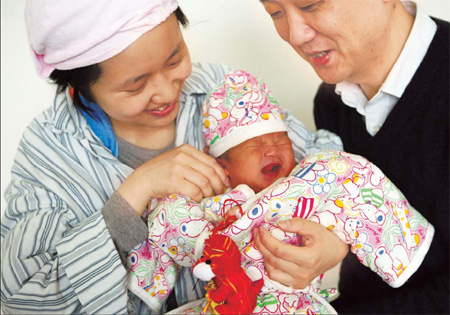 A couple hold their baby at a hospital in Beijing. Births in Beijing during Spring Festival fell due to superstition that babies born in the Year of the Tiger can be problematic.
Zou Hong / China Daily |
The number of babies born in the Year of the Tiger dropped nearly 30 percent in the first month of the Chinese New Year, according to the Haidian Maternal and Child Health Hospital.
The decline suggests that parents are holding off on having a child this lunar year because of traditional beliefs that Tiger year children are temperamental, officials at the hospital said.
"It is really strange," said Dr Jia Hongmei, director of the hospital's Department of Obstetrics and Gynecology. "If I didn't compare numbers in 2010 and 2009 of the same period, I would never have expected the decrease."
In the prior Year of the Ox, more than 11,000 babies were born in the hospital.
According to the statistics, from Feb 1 to 23, 662 Tiger babies were born in the hospital, a sharp fall from the 934 registered during the same period last year.
"My mother suggested that I have a baby next year, because we preferred a girl," said recent bride Han Yue, 28, who thinks Tiger girls will not grow up to be gentle ladies.
Other couples holding the same traditional thoughts as Han have chosen to delay childbirth to avoid tiger babies, hospital officials say.
It is widely believed that babies take on their zodiac animals' characteristics.
According to Wang Haohua, deputy secretary-general of the Traditional Chinese Culture Promotion Association, Tigers have edgy tempers and lack emotional stability, making them less patient and more prone to mistakes.
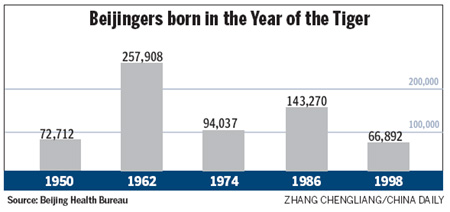
In each of the past five Tiger years - 1950, 1962, 1974, 1986 and 1998 - the number of births dropped from 72,712 to 66,892 in Beijing.
From 1962 to 1974, the number even declined from 257,908 to 94,037.
"I believe the number of Tiger babies in 2010 will continue to fall," Wang forecasted.
"Lots of people still hold a belief in the lucky date and lucky year for a baby," said Zhang Lihua, head nurse at the Beijing Obstetrics and Gynecology Hospital. "Some of them even chose cesarean birth due to such traditional thoughts."
In the pursuit of "eight" - which means great fortune and good luck in China - more than 50 couples chose to give birth on the eighth day of the month in the hospital last year, 50 percent more than on ordinary days.
"The traditional thoughts on lucky dates are reasonable. It can be traced back 5,000 years. It is necessary for us to keep this old tradition," Wang added.
Other young couples who planned to have babies this year see their Tiger babies as having the potential energy and power as the animal.
"Why not have a Tiger baby?" asked Ye Hongyi, who is preparing to be a mother this year.
"If I get one this year, it will be the best gift to my family, because three of our family members were born in the Year of the Tiger."
Ye said that even though her grandmother and other elderly relatives still believe that the time of birth can determine one's destiny for life.
"My husband and I don't care about that," she added. Neither do many of our colleagues."
"To assign an animal for the birth year is traditional culture in China," said Xiao Fang, a professor of Folklore at Beijing Normal University.

